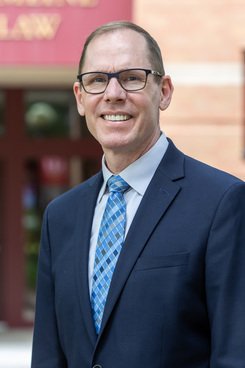The decision to be open about one’s sexual orientation is deeply personal. But for many queer law deans, the decision’s potential impact on the people they lead is often a key part of the calculus.
“I feel it is important for me to be openly gay as a dean because representation matters,” Anthony Niedwiecki, president and dean of Mitchell Hamline School of Law, told Law.com.
“I’ve been given the gift of being able to be a dean, and I want to show other LGBTQ+ people that you can be your authentic self and still be in leadership positions,” Niedwiecki said. “I honestly believe I’m a much better leader because I’m openly gay and authentic. I couldn’t imagine leading and not being openly gay.”
“[A]s the first Black, female and gay law dean at Rutgers Law, I have an unwavering belief that representation matters,” Kimberly Mutcherson, dean and professor of law at Rutgers Law School in Camden told Law.com in an email, echoing Niedwiecki’s sentiment.
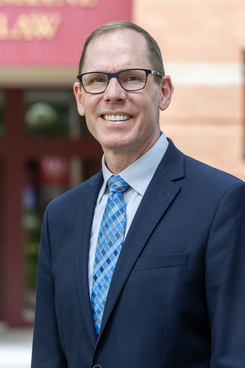 Mitchell Hamline School of Law Dean Anthony S. Niedwiecki. (Courtesy photo)
Mitchell Hamline School of Law Dean Anthony S. Niedwiecki. (Courtesy photo)“It’s important for those of us who have multiple identities to show up as our full selves in our professional lives for our own wellbeing and because it gives our students an opportunity to imagine themselves in our shoes,” she said.
Anthony Crowell, president and dean of New York Law School, told Law.com that “when it comes to our LGBTQ+ community members, an out dean must always be a proud representative and advocate who reflects an understanding of the lived experiences and unique challenges and hardships of some of those who identify as such.”
“A dean’s job is to be a positive, accessible and inspirational, leader and role model for their community,” he said. “Projecting pride, confidence and possibility, and demonstrating how to add value because of your own unique lived experience makes clear for others that LGBTQ+ lawyers have a critical voice and are an equal stakeholder in shaping the profession.”
Mutcherson witnessed this dynamic firsthand when she was a law student.
“I am actually typing this message on a train back home from NYC where I had lunch with a law school mentor who is a Black gay man, Professor Kendall Thomas,” Mutcherson said. Thomas is the Nash professor of law at Columbia Law School, where Mutcherson earned her J.D. in 1997.
“The example he set for me decades ago when I was his student as an out and proud Black gay man is one that I try to emulate in my own life as an academic and now as law school leader,” Mutcherson said.
“It is funny how much being openly queer still matters,” Michael Donnelly-Boylen, associate dean for enrollment and strategic initiatives at Roger Williams University School of Law, told Law.com.
“My office, whether I like it or not, becomes a de facto LGBTQ+ Student Center,” he said, but added that he loves it and the fact that “our queer students can always find a home here and someone who will listen and not judge.”
“People come to law school to become leaders and they seek role models,” he said. “Seeing me be authentically myself matters to my students as they develop their own professional identity.”
Donnelly-Boylen said he encourages students to always be true to themselves even when spaces don’t feel welcoming.
“When we are true to ourselves, we will eventually find the professional home that fits,” he added.
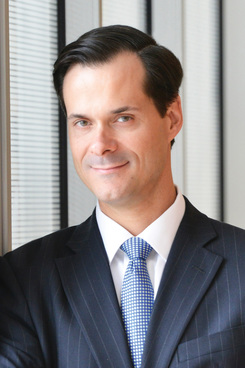 Anthony W. Crowell, dean and president of New York Law School. (Courtesy photo)
Anthony W. Crowell, dean and president of New York Law School. (Courtesy photo)Crowell said it’s “especially critical for students who may be struggling and don’t have the kind of support needed at home or from friends to be out, and who need to embrace self-acceptance and to bring it forward powerfully in their careers.”
“I have had many LGBTQ+ students, as well as many of their parents, thank me for being so open and willing to share my journey, and to be there for them,” Crowell said. “Often LGBTQ+ students or young alumni need the perspective and the ear or shoulder of someone who has walked a similar path, and confronted similar challenges.”
Crowell also noted that “many of our students come from areas of the country where laws are being passed to suppress the rights, expression, and recognition of LGBTQ+ individuals.”
“It’s good to be a law school in New York City that can support them and also motivate them to use their legal training to challenge these and other profound injustices,” he said.
Unfortunately, these injustices seem to be multiplying recently, which law school leaders said makes the examples they set even more crucial.
Mutcherson said that “at a time when attacks against the LGBTQIA community appear to be ramping up, especially against trans people, solidarity means that those of us who have any kind of power should use it in service of a greater good and we can’t do that if we’re hiding or being coy about our authentic selves.”
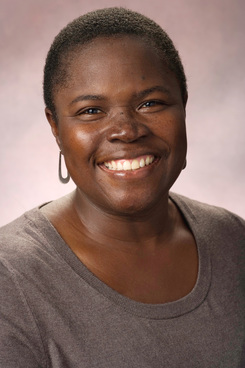 Kimberly Mutcherson, co-dean of Rutgers Law School-Camden. (Courtesy photo)
Kimberly Mutcherson, co-dean of Rutgers Law School-Camden. (Courtesy photo)But it’s not only about setting an example for others. Just as it’s crucial for law students to feel like they can be their whole, authentic selves, it’s equally as important for law deans to feel that way.
“My intersectional identity is core to how I think about the law and law schools, so I could not be as effective in the work that I am doing if I was not bring true to myself,” Mutcherson said.
Larry Cunningham, provost, dean and professor of law at Charleston School of Law, also addressed the importance of intersectional identity.
“Law schools, our students and the legal profession benefit when a greater diversity of voices is heard, including at the leadership level,” he said. “At the same time, intersectionality is important. People should not, and cannot, be reduced to a single characteristic.”
“I bring many characteristics and life experiences to my work,” Cunningham said. “That’s part of why I believe higher education should be the ultimate ‘safe space’ where ideas are freely exchanged and people can share their diverse views and experiences (complex as they may be) in a collegial manner.”
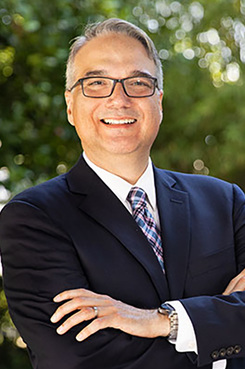 Anthony Varona, dean-designate and professor of law of Seattle University School of Law. (Courtesy photo)
Anthony Varona, dean-designate and professor of law of Seattle University School of Law. (Courtesy photo)“I choose to be an openly gay law school dean, who also is a first-generation Latino immigrant with English as a non-native language, because for too long people like me have thought of a career in law as being out of our reach,” Anthony E. Varona, dean-designate and professor of law of Seattle University School of Law, told Law.com.
“I choose not to be closeted as a gay law school dean and professor because, for too long, openly LGBTQ Americans were categorically barred from the legal profession and, even worse, were treated as outlaws solely for being who we are as people,” Varona added.
“I choose to be out because the closet only perpetuates discrimination, stigma and trauma, and because I love and respect my husband and partner of 28 years too much to keep our marriage in the shadows of shame,” he continued.
“I choose to be out as a legal education leader because I want gay, lesbian, bi, trans and queer young people not only to know that can they, too, can become out lawyers and law professors and law deans, but also to understand that our legal profession and system—which must better reflect the communities we serve—need them to choose law as a career,” Varona said.
“Part of the equation, of course, is that being gay is one of many characteristics, skills and sensibilities that make each of us unique individuals and professionals,” Crowell said. “For me, I don’t look at myself as the gay lawyer or gay dean, but I am a lawyer and a dean who, among so many other things, also is gay.”
Cunningham agreed.
“I don’t consider myself a gay dean; I’m a law school dean who happens to be gay,” he said. “My duty, first and foremost, is to help all of our students succeed in law school and the profession.”
“As someone whose constitutional right to marry was only recently recognized by the Supreme Court, I bring to my position a particular appreciation for the Constitution, the legal system and those who safeguard the freedoms of others,” he added.
Cunningham said he also recognizes the importance of diversifying the law profession so that “the bar and bench are more representative of the communities and clients we serve; that includes making sure LGBT people become lawyers, judges, law professors and deans.”

